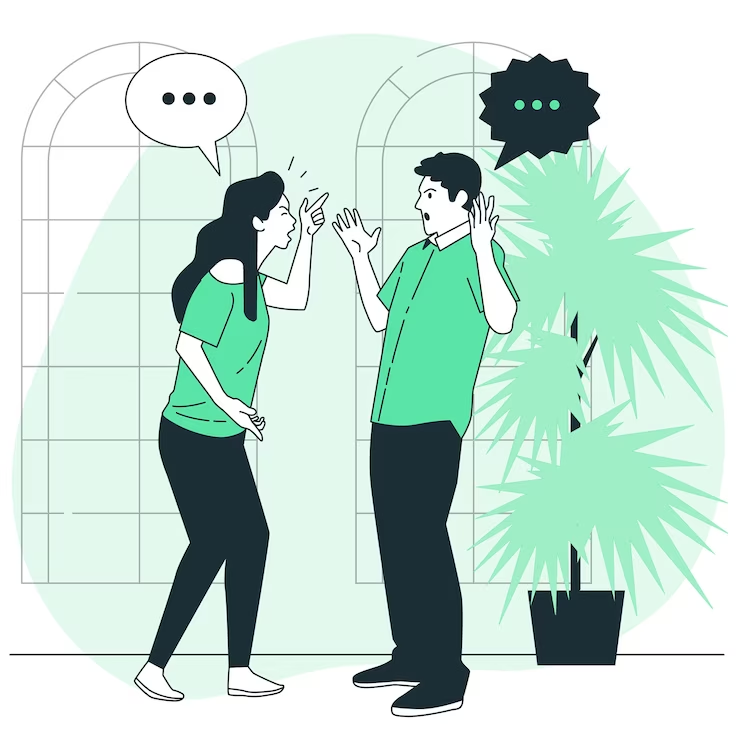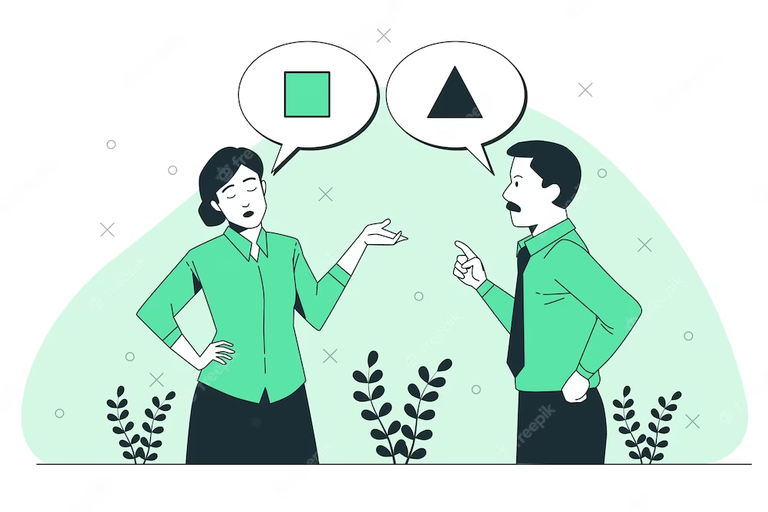Mastering the Art of Active Listening: How it Can Help You Navigate Difficult Conversations

People illustrations by Storyset
I practice active listening as often as I can with people, not only because I will need it for therapy sometime in the future, but also because the results I get from it are phenomenal. What is beautiful is that we all can use it in our daily lives, but we don’t know it. If only this was taught in public schools, human beings would be more powerful than we already are, and it would reduce the number of therapy sessions people needed. Imagine that!
From the jump, I'm sure some of you think that this is some psychological form of mind control, but in reality, many of us already practice it in our lives. However, halfway into it, we mess it up and get back into the fight because we allow our brains to talk us into it. Active listening is a skill that can be learned by anyone. It involves paying attention to what is being said and how it's being said by the speaker to understand the meaning of what is being said and the reason why it was said. The reason why it is called active listening is that the person who is listening is actively doing it.
Have you ever been in a class where they are teaching a topic that you found puzzling and the lecturer has so far laid the path straight for you to understand every detail?
What happened when you missed one aspect of it? I’m sure you raised your hand and asked a question… Or maybe it was a friend giving you the layout of a very interesting story, and somehow you are at a point in the story you don’t understand, you would find a way to ask exactly how you got to that point in the story. You might need to clarify the story to them by giving a summary of what you heard. In active listening, you are taking that whole process and applying it to an important conversation or a therapy session.
Difficult Discussion

People illustrations by Storyset
If you have been in any relationship long enough, then you know that a time will come when you need to talk about a topic that is difficult for both of you. Some people take the route of hashing out problems as soon as they arise, while some people avoid the conversation to the point that they can tolerate. Regardless of the means through which you take to reaching that point (and I am not advising you on which), a difficult discussion has arrived and it needs to be hashed out.
Trashing it out is the problem… My roommate and I had a similar build-up of what we could tolerate. I am usually the kind of person who wants to talk immediately when I sense there's a problem, but he appears to be more of the 'wait till I've had enough' kind, so we meet somewhere in the middle.
You can sense that the discussion is coming because it becomes a pivotal point in the relationship/friendship that cannot be avoided. The two of you have some explaining to do, but the problem is that there is no mediator between you.

People illustrations by Storyset
As the conversation starts and when you've noticed you've reached the end, you need to be fully engaged in the conversation you're having. Draw yourself away from distracting thoughts that may come up in any form.
You might be distracted by a lot of things in this situation if you're not aware of your propensity to be distracted. One important way of staying engaged is to keep a healthy amount of eye contact with the person you're talking to. This will not only show that you're interested, but you'll also be able to tell when some people (based on their communication style) are giving important details.
While watching the nonverbal eye cues, you should also be watchful for other nonverbal cues from their facial expressions, body posture, gestures with their hands, tone of their voice, proximity, touch, and the way they appear. We will go in-depth on some of these topics when we touch on nonverbal cues.
If you're able to note some of the changes and cues as they communicate, you might want to clarify with questions regarding some of their statements. For example, my roommate has been getting me locum jobs for a while, and he expressed that he did not think I was grateful. Maybe it was in the way I expressed my gratitude or my behavior in between... but we have been friends for over 10 years, and you would expect that he would be able to read me better.
He said, "It's as if you're not grateful for the jobs I've been getting you" with a sad face and looking me in the eye. My interpretation was that he did not believe what he said, but he said it because it was how he felt, so I asked him for clarification.
"If someone asked you if Ebingo is grateful, you would say no" ... He then clarified that he didn't mean it that intensely but that during a particular job, my behavior was not exactly pleasant.
I explained myself, and the issue was resolved.
It is essential to summarize what they are saying and try to repeat it back to them or paraphrase it in the way you understood it.
Don't listen to respond to what they are saying, but listen to understand. Don't criticize them for having certain opinions, and help them come up with a solution that both of you can agree on.
Do you have difficult conversations you find hard to trash out and get to the solution of the problem?
In conclusion, active listening is a powerful tool that can improve our relationships and reduce the need for therapy sessions. It involves paying attention to what is being said and how it's being said by the speaker to understand the meaning of what is being said and the reason why it was said.
By actively engaging in conversations, staying focused, and watching for nonverbal cues, we can enhance our communication skills and resolve difficult discussions. Remember to listen to understand, not just to respond, and to approach conversations with an open mind and a willingness to find a solution that works for everyone involved.
By incorporating active listening into our daily lives, we can become more powerful and effective communicators.

Inkscape.org
Listening is important part of a conversation but mostly people love to talk and don't like to listen that's the problem, we should only talk when it's needed and other person allow us
Its a skill everyone can build and should try to build.
Thanks for your contribution to the STEMsocial community. Feel free to join us on discord to get to know the rest of us!
Please consider delegating to the @stemsocial account (85% of the curation rewards are returned).
You may also include @stemsocial as a beneficiary of the rewards of this post to get a stronger support.